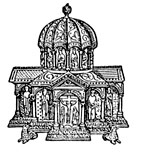
A Catholic Alternative to Decadent Colleges
ON THE TRANSMISSION OF CULTURE & CIVILIZATION
The quality of culture is usually measured in terms of such things as the availability of operas, plays, art galleries, and poetry readings. It is common to associate both culture and civilization with cosmopolitan cities such as London, Paris, and New York, and with famous colleges and universities such as Harvard, Yale, and Princeton. However, as Sir Kenneth Clark wrote in Civilisation: A Personal View, civilization “can be created in a monastery or a court just as well as in a city — perhaps rather better.”
Civilization can appear in the most obscure, humble, and unlikely of places — not only in monasteries but also in a hovel, as Odysseus learns when he appears as the beggar in disguise in the hut of the swineherd Eumaeus (in Homer’s Odyssey). This simple servant treats his disguised royal guest with hospitality fit for the gods: “Odysseus was delighted by this welcome and did not hide his pleasure. ‘My good host,’ he said, ‘I hope Zeus and the other gods will reward you with your heart’s desire for receiving me so kindly.'” This gracious hospitality resembles the same good manners that Telemachus displays toward the goddess Pallas Athene appearing in the disguise of Mentes at the beginning of the Odyssey.
Homer’s Odyssey provides criteria for civilization that locate it, not in great cities or renowned centers of learning, but in the customs and rituals of daily life. The kindness of Eumaeus to the beggar and the welcome of Telemachus to his visitor form a recurring pattern throughout the book. Telemachus himself is received with the same gestures of hospitality he proffered to the stranger. Visiting Nestor and his sons for news of his father, Telemachus is greeted warmly: “But as soon as they caught sight of the strangers they all made a move in their direction, waving their hands in welcome, and beckoning the newcomers to join them.” When Telemachus travels next to Menelaus’s home to seek more news of Odysseus, the king is celebrating a wedding banquet. He tells the servant, “Unyoke their horses at once, and bring our visitors into the house to join us at the feast.” Thus the custom of hospitality to strangers of all ranks and backgrounds, from princes to beggars, distinguishes a civilized people, who consistently demonstrate graciousness as a normal part of daily living.
More than the availability of art, poetry, music, sports, and scholarship, civilization is a habitual way of life, an environment or atmosphere that cultivates the art of living. It involves a set of actions that reflect manners, formalities, and rituals that uplift human life and bring cheer to the heart and soul — not just on special occasions but in the course of daily life. Civilized ways awaken in man a sense of propriety and dignity and an appreciation of the true, the good, the beautiful, and the noble — the pursuit of which is desirable for its own sake rather than as a means to an end. More than the sophisticated, exotic pleasures of famous ancient cities, civilization involves the considerate amenities of gracious living and the delicious taste of simple goodness provided by life’s purest enjoyments. In the scenes of hospitality from the Odyssey, the travelers appreciate the hearty welcome, convivial affability, sumptuous food and sparkling wine, the cheerful fire, and delightful conversation and storytelling. The opposite of civilization in the Odyssey is barbarism, the violence and cannibalism of the Cyclops, whose only pleasures are the visceral ones of eating and drinking like animals.
You May Also Enjoy
Archbishop Chaput says if parents "live in a manner that openly rejects" Catholic beliefs, "then partnering with those parents becomes very difficult, if not impossible."
Method more than content was the real drawback in the teaching of Latin and Greek before they were "squeezed out of the curriculum."
While many Church officials and patrons are still intent on erecting ugly novelty churches, some architects are taking a different approach.

